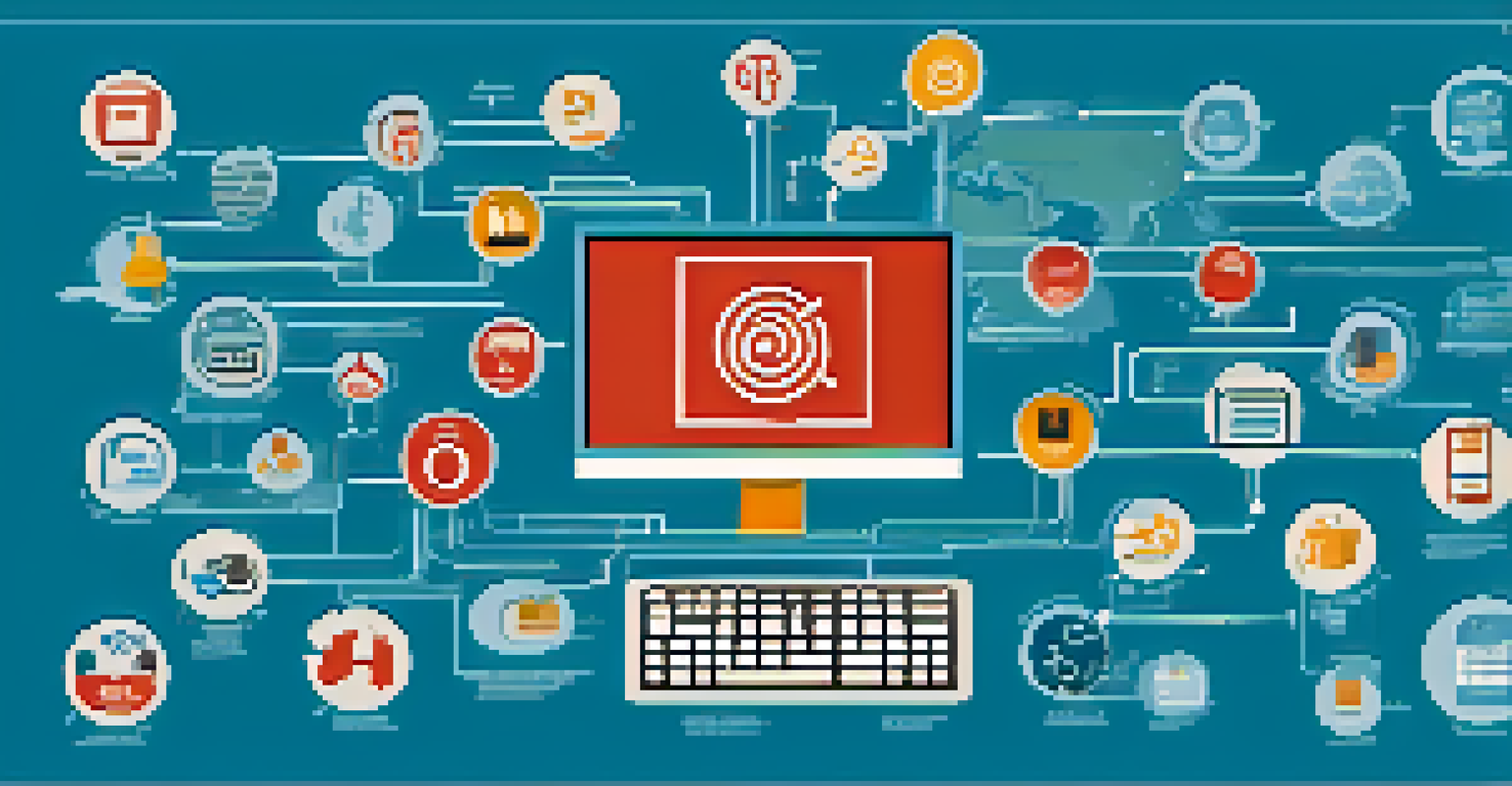Recognizing Compulsive Behaviors: Signs of Internet Addiction

Understanding Internet Addiction: What Is It?
Internet addiction refers to excessive use of the internet that disrupts daily life. People may find themselves spending hours online, often at the expense of personal relationships and responsibilities. This behavior can stem from various factors, including the desire for social interaction or escapism from reality.
The internet is a great way to get information, but it is also a great way to get lost.
Unlike occasional internet use, internet addiction can lead to a compulsive need to stay connected, often making it challenging to unplug. Just like someone might binge-watch a series, a person with internet addiction may feel an overwhelming urge to keep scrolling through social media or playing online games.
Recognizing this pattern is crucial, as it can lead to detrimental effects on mental health, productivity, and social connections. Understanding what constitutes internet addiction is the first step toward addressing it.
Identifying Signs of Compulsive Internet Use
One of the most apparent signs of internet addiction is the inability to control the amount of time spent online. If you or someone you know frequently loses track of time while browsing, it might be worth a closer look. For example, spending three hours online may feel like only thirty minutes, indicating a compulsive tendency.

Other signs include neglecting responsibilities, such as work or household chores. If a person prioritizes online activities over crucial tasks, it can significantly impact their life. For instance, someone might skip family gatherings or ignore deadlines due to excessive gaming or social media scrolling.
Internet Addiction Disrupts Life
Excessive internet use can negatively impact personal relationships, responsibilities, and overall well-being.
Physical symptoms can also emerge, including sleep disturbances and eye strain. These physical signs are often overlooked but are essential indicators of problematic internet use that can affect overall well-being.
Emotional Indicators of Internet Addiction
Emotional distress can be a key sign of internet addiction. Individuals may use the internet as a coping mechanism to escape feelings of loneliness, anxiety, or depression. For example, someone may turn to online gaming to avoid dealing with stress from work or personal relationships.
We are not just passive consumers of technology; we are its active architects. The path we take is shaped by our choices.
If online interactions start to replace real-life connections, it can lead to feelings of isolation. This paradox is common; despite being 'connected' online, people may feel more alone than ever. It’s important to recognize when virtual relationships start to take precedence over meaningful, face-to-face interactions.
Moreover, irritability and restlessness when offline can indicate a dependency on internet use. If someone feels anxious or agitated when they cannot access the internet, this emotional response is a significant red flag.
The Role of Social Media in Internet Addiction
Social media platforms play a significant role in internet addiction, often creating a cycle of compulsive behavior. The instant gratification of likes, shares, and comments can lead to an obsessive need for validation. For example, someone may find themselves refreshing their feed multiple times to see new interactions.
The fear of missing out (FOMO) can further exacerbate this behavior, making it difficult to step away from these platforms. This constant need to stay updated can lead to extended periods online, pushing aside other important aspects of life.
Signs of Compulsive Internet Use
Inability to control online time, neglecting responsibilities, and physical symptoms like eye strain are key indicators of internet addiction.
Additionally, social comparison can contribute to feelings of inadequacy, prompting individuals to spend even more time online. This cycle of comparison can trap people in a loop of compulsive behavior, impacting their self-esteem and overall happiness.
Impact of Internet Addiction on Daily Life
Internet addiction can significantly disrupt daily life, affecting work, relationships, and overall well-being. For instance, someone might find themselves late to work or missing deadlines due to excessive online activities. This can lead to job performance issues and potentially jeopardize one's career.
In personal relationships, the effects can be equally damaging. Friends and family may feel neglected if someone spends more time online than engaging in real-life interactions. Over time, this can create strain and distance between loved ones, leading to emotional fallout.
Moreover, the consequences can extend to physical health, with sedentary behavior linked to various health issues. Spending prolonged periods online can contribute to a lack of exercise, poor posture, and even weight gain, highlighting the need for a balanced lifestyle.
Seeking Help for Internet Addiction
Recognizing the signs of internet addiction is the first step toward recovery. If you or someone you know is struggling, seeking help can be a transformative choice. There are numerous resources available, from therapy to support groups, that can provide guidance and support.
Cognitive-behavioral therapy (CBT) is particularly effective, helping individuals understand and modify their compulsive behaviors. It focuses on identifying triggers and developing healthier coping mechanisms, making it easier to balance online and offline life.
Preventing Internet Addiction
Establishing healthy online habits and engaging in offline activities can help prevent the development of internet addiction.
Additionally, setting boundaries around internet use, such as designated 'internet-free' times, can encourage healthier habits. Creating a structured approach can not only reduce compulsive behaviors but also enhance overall quality of life.
Preventing Internet Addiction: Healthy Online Habits
Preventing internet addiction starts with establishing healthy online habits. Consider setting time limits for social media and gaming, allowing for a more balanced lifestyle. For instance, using apps that track online time can help individuals become more aware of their usage patterns.
Engaging in offline activities is also essential. Hobbies like reading, exercising, or spending time with friends can provide a fulfilling alternative to excessive internet use. For example, scheduling regular outings can help reinforce social connections and reduce the urge to stay online.

Ultimately, fostering a mindful approach to internet use can prevent compulsive behaviors from developing. By prioritizing balance and awareness, individuals can enjoy the benefits of the internet without falling into the trap of addiction.